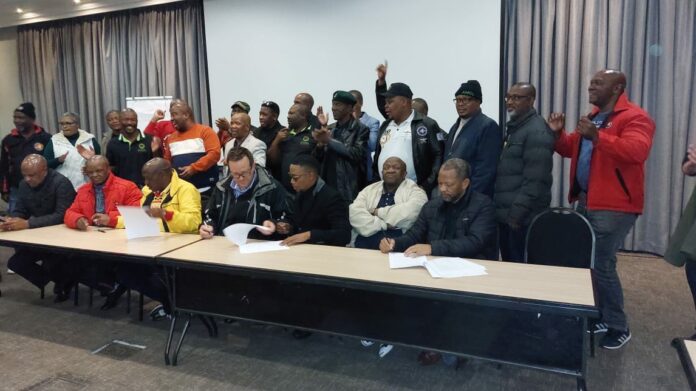
SIBANYE-Stillwater saved a three-year wage deal with unions by extending a R3,000 ex-gratia payment to all categories of employees.
The agreement, signed late last night, ends a three month strike first called by the National Union of Mineworkers (NUM) and the Association of Mineworkers & Construction Union (AMCU) on March 8. It had been preceded by around eight months of negotiations.
The wage agreement was supposed to have been signed on June 6 after intervention by the Commission of Conciliation, Mediation and Arbitration (CCMA). The CCMA’s intervention had been requested by Sibanye-Stillwater.
Following the CCMA’s mediation, unions were given the mandate to accept a three year deal, offering a R1,000 per month increase in the first year and then increasing to R900/month and R750/month in the second and third years respectively.
This was equal to an average 6.3% increase over the three years while artisans and miners were offered a 5%, 5.5% and 5% wage uplift over the period. But this category of employee was excluded from the ex-gratia payment which was intended only for category 4 to 8 employees.
As a result, the NUM and AMCU decided not to sign the agreement. They also cavilled the extension of the wage agreement terms to UASA and Solidarity, unions that had joined a negotiating coalition with NUM and AMCU before accepting an offer from Sibanye-Stillwater.
During subsequent discussions last week the CCMA threatened to withdraw from the process raising the risk that the strike at the gold mines would enter a fourth month.
“We conceded on the R3000 to miners and artisans,” said James Wellsted, senior vice-president of Sibanye-Stillwater on Saturday. Unions accepted that all unions would receive the new terms.
With the agreement signed, attention now turns to getting Sibanye-Stillwater’s gold mines back into production, as well as the conclusion of wage talks between the company and unions at its platinum group metal operations.
The gold mines strike has taken its toll on employees.
Azar Jammine, chief economist at Econometrix, told BusinessLive that union members “lost out badly” for sustaining a strike at Sibanye-Stillwater’s gold mines. “They lost a fortune of money for having been out on strike for so long, and they have not got so much from the proposed wage deal,” he told the publication.
“The only losers are the workers if they carry on with the strike. Union leaders and company management get their salaries irrespective, but the workers don’t,” said René Hochreiter, an analyst for Noah Capital Markets and MD of Sieberana Research.
William Mabapa, general-secretary of the NUM, rejected these criticisms, however. He said they were “not correct”.










